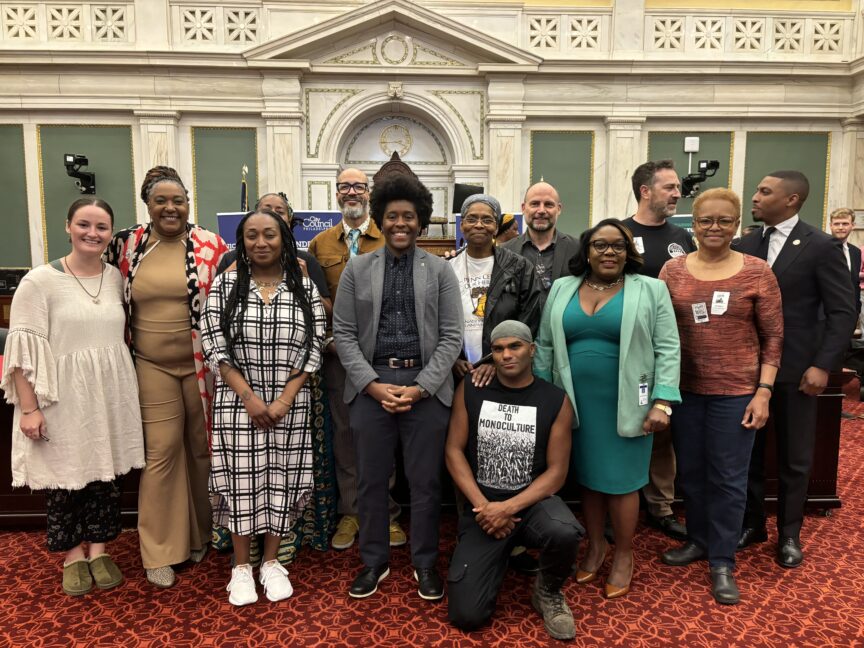May 22, 2024
The legislation establishes a priority bid for the Land Bank to acquire vacant properties, including hundreds of community gardens in high-poverty neighborhoods.
PHILADELPHIA – Today, legislation establishing a priority bid for Philadelphia’s Land Bank passed out of City Council’s Committee on Public Property and Public Works. Minority Leader Kendra Brooks (At-Large) introduced the legislation as part of a years-long process to secure the future of community gardens in primarily Black and brown neighborhoods.
“We have seen residents who have faced decades of disinvestment in our neighborhoods take the initiative to clean up abandoned lots and transform them into vibrant community spaces through gardening,” said Minority Leader Brooks. “This is an environmental issue, a public safety issue, and a racial justice issue. By passing the Priority Bid bill out of this committee, we are continuing the progress our City has made in returning ownership of this land from Big Banks to our neighbors.”
“Urban farms and community gardens provide neighbors the chance to build community, gain valuable skills, beautify their blocks, improve air quality, access fresh produce, and even reduce gun violence,” said Councilmember Jamie Gauthier (3rd District), Chair of City Council’s Committee on the Environment. “We must restore the Land Bank’s priority bid to ensure the stability of community green spaces.”
In 1996, Philadelphia was home to over 500 community gardens, but over the past 25 years, over a third of those gardens have been lost to development. If the legislation passes, the Land Bank will be able to acquire community garden land and transfer the titles to community organizations like the Neighborhood Garden Trust, which will preserve them as shared green spaces for residents to enjoy.
“Despite proven benefits, upwards of 200 gardens and farms face an existential threat because the people caring for them do not have legal land tenure,” said Jenny Greenberg, executive director of the Neighborhood Gardens Trust (NGT). “It is essential that the Land Bank be able to resume acquisitions and that it has the resources to scale up the number and pace. If not, the city will continue to lose gardens, and we will continue to scramble to save them when they are acquired by developers.”
In her first term on City Council, Minority Leader Brooks championed the protection of community-led gardens. After recognizing that the liens on many tax-delinquent properties had been sold by the City to a large private bank, she worked with the Kenney administration to pay off the liens on 90 parcels of community garden land and protect that land from the threat of sheriff sale.
“Recently the City made a substantial financial investment to ensure that 90 garden parcels in primarily Black and Brown neighborhoods will be protected from Sheriff Sale by clearing liens held by U.S. Bank on tax delinquent, privately held properties,” said Mimi McKenzie, the Legal Director at the Public Interest Law Center. “Now we need to ensure that the Land Bank, the Administration, and City Council can finish the job by foreclosing on these properties, having the Land Bank exercise its priority bid, clearing title, and ultimately transferring these parcels to their longtime stewards for nominal disposition fees.”
“Our city needs to create better ways through policy, conversations, and processes to recognize residents who have invested their time and personal funds while taking ownership of vacant lots and turning them into community gardens. My grandmother was a community gardener for more than 25 years. I have seen firsthand the positive impact through connecting and feeding communities that these spaces have,” said Councilmember Quetcy Lozada (7th District), Chair of the Committee on Public Property and Public Works. “The Land Bank was created to put our city’s vacant land to use, protect land that is being used by the community, and accelerate our city’s land transfer process in an efficient and equitable manor. This legislation is the start of much needed reforms to the Land Bank. It will allow them to overcome the barriers they face and improve their systems so they can achieve the vision Council set forth when creating it.”
The legislation is expected to come before the full City Council for a vote on Thursday, May 23.
###


